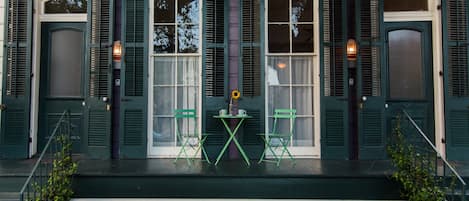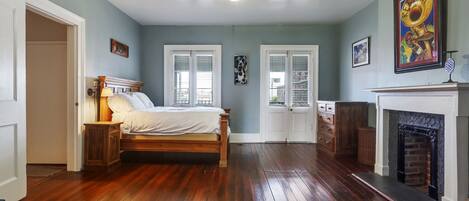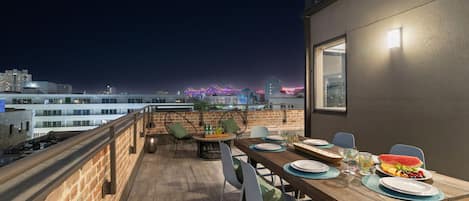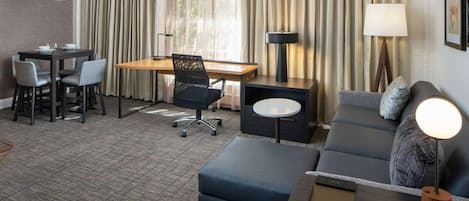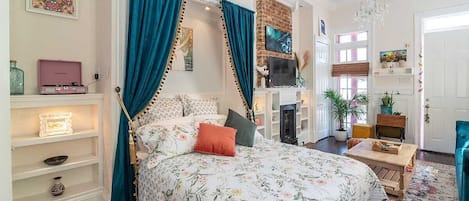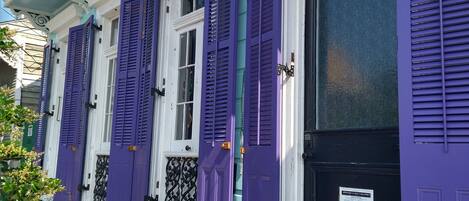Departamento
Stylish Escape in Historic Warehouse District
Departamento con cocina, a 5 min a pie de Museo Nacional de la Segunda Guerra Mundial
Galería de fotos de Stylish Escape in Historic Warehouse District





Opiniones
9.8 de 10,
Excepcional
2 habitaciones2 baños4 personas130.1 metros cuadrados
Servicios principales
Explora la zona

- Place, Museo Nacional de la Segunda Guerra Mundial
- Place, Centro de convenciones Ernest N. Morial
- Place, Canal Street
- Airport, Nueva Orleans, LA (MSY-A. Internacional Louis Armstrong New Orleans)
Habitaciones y camas
2 habitaciones (para 4 personas)
Habitación 1
1 cama Queen
Habitación 2
1 cama King
2 baños
Baño 1
Excusado · Solo regadera
Baño 2
Tina o regadera · Excusado · Tina de hidromasaje
Ambientes
Deck o patio
Cocina
Con balcón
Área de comedor
Información de la propiedad
Stylish Escape in Historic Warehouse District
The elegant townhouse at 838 Camp Street was designed by James Harrison Dakin (1806-1852), an influential architect in New Orleans who also designed the landmark St. Patrick’s Cathedral down the street. The land was first owned by Gasquet, Parish & Co., a commission merchant company largely responsible for the initial development of the American Sector. Construction on this townhouse, originally one of nine sister “rowhouses,” began in the early 1840s.
The first known inhabitant of the townhouse was Walter Cox, a cotton merchant and owner of the cotton firm W. Cox & Co. established in 1858. It appears that the Civil War resulted in Cox’s firm going bankrupt, as his home was sold in a sheriff’s auction in 1867. The house was purchased by attorney Alfred J. Philips, partner in the esteemed New Orleans firm of Roselins & Philips. Sometime during the 1870s, ownership of the property transferred from Philips to his brother-in-law, influential attorney John Blackstone Cotton from Georgia, who married Alfred’s younger sister Sophia in 1852. Blackstone served as a New Orleans City Attorney in 1850, as a District Judge (1853-1857) and as Superintendent of Elections (1857-1858). During the Civil War, Cotton served as a Confederate Army Officer from 1861 until he fell ill in the field in 1862.
Margaret Robinson Barnett (1887–1977) purchased the property in May of 1921. Margaret owned and operated “Dixie Stove Works” out of what is now the property’s commercial space at 840 Camp. The company boasted itself as “the South’s largest manufacturer of stove parts.” Margaret and her husband also housed “Roomers” in the properties residential units beginning in 1930. These renters hailed from such varied places as Germany, New York, Louisiana, Minnesota, and South Dakota. The residence had become primarily commercial in the latter half of the 20th century, with Dixie Stove Works as its last commercial occupant.
The first known inhabitant of the townhouse was Walter Cox, a cotton merchant and owner of the cotton firm W. Cox & Co. established in 1858. It appears that the Civil War resulted in Cox’s firm going bankrupt, as his home was sold in a sheriff’s auction in 1867. The house was purchased by attorney Alfred J. Philips, partner in the esteemed New Orleans firm of Roselins & Philips. Sometime during the 1870s, ownership of the property transferred from Philips to his brother-in-law, influential attorney John Blackstone Cotton from Georgia, who married Alfred’s younger sister Sophia in 1852. Blackstone served as a New Orleans City Attorney in 1850, as a District Judge (1853-1857) and as Superintendent of Elections (1857-1858). During the Civil War, Cotton served as a Confederate Army Officer from 1861 until he fell ill in the field in 1862.
Margaret Robinson Barnett (1887–1977) purchased the property in May of 1921. Margaret owned and operated “Dixie Stove Works” out of what is now the property’s commercial space at 840 Camp. The company boasted itself as “the South’s largest manufacturer of stove parts.” Margaret and her husband also housed “Roomers” in the properties residential units beginning in 1930. These renters hailed from such varied places as Germany, New York, Louisiana, Minnesota, and South Dakota. The residence had become primarily commercial in the latter half of the 20th century, with Dixie Stove Works as its last commercial occupant.
Agrega fechas para ver los precios
Servicios
Cocina
Lavadora
Secadora
Mascotas
Wifi gratis
A/A
Propiedades similares
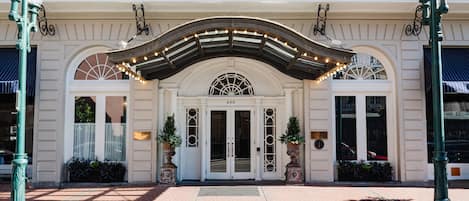
The Lafayette New Orleans By Kasa Living
The Lafayette New Orleans By Kasa Living
- Acepta mascotas
- Wifi gratis
- Aire acondicionado
- Estacionamiento disponible
8.6 de 10, (1006 opiniones)
Reglas de la propiedad
Hora de inicio del check-in: 15:00
Hora límite del check-out: 11:00
Niños
Se permiten niños: edad mínima de 0 a 17 años
Eventos
No se permiten eventos
Mascotas
Se aceptan mascotas: perros (1 máximo)
Contact us for more information.
Fumar
No se permite fumar
Información importante
Información importante
Podría aplicarse un cargo por persona extra, que varía según la política de la propiedad
Es posible que debas presentar una identificación oficial con fotografía y una tarjeta de crédito, una tarjeta de débito o hacer un depósito en efectivo en el check-in para cubrir cualquier gasto imprevisto
Las solicitudes especiales no se pueden garantizar. Están sujetas a disponibilidad al momento del check-in y pueden tener un costo extra
No se permiten fiestas ni eventos de grupos
El anfitrión indicó que hay un detector de monóxido de carbono en la propiedad
El anfitrión indicó que hay un detector de humo en la propiedad
El equipamiento de seguridad de esta propiedad incluye extintor de incendios
Número de registro de propiedad: 23-OSTR-20491, 21-CSTR-12112
Avisos importantes
No se necesita un auto para acceder a este hospedaje.
Información de la zona
Nueva Orleans
Este departamento se encuentra en la zona centro de Nueva Orleans. Bourbon Street y Frenchmen Street son sitios emblemáticos, y Puerto de Nueva Orleans y Terminal de cruceros de Julia Street son algunos de los lugares que se pueden visitar para hacer actividades en el área. ¿Quieres asistir a un evento o partido? Consulta el calendario de Estadio Caesars Superdome o Pabellón de hockey Smoothie King Center. En la zona puedes practicar actividades como pesca, o disfrutar del aire libre mientras haces ciclismo.

New Orleans, LA
Qué hay cerca
- Museo Nacional de la Segunda Guerra Mundial - A 5 min a pie - 0.5 km
- Centro de convenciones Ernest N. Morial - A 8 min a pie - 0.7 km
- Canal Street - A 10 min a pie - 0.9 km
- Casino Harrah's New Orleans - A 11 min a pie - 1.0 km
- Bourbon Street - A 13 min a pie - 1.1 km
Medios de transporte
Restaurantes
- Pêche Seafood Grill - A 2 min a pie
- Flamingo A-Go-Go - A 2 min a pie
- The American Sector - A 5 min a pie
- Junebug - A 2 min a pie
- Sofia Nola - A 2 min a pie
Preguntas frecuentes
Acerca del anfitrión
Anfitrión: Damon
I have lived in New Orleans for past thirty years. Whether you are a family or large group coming for an event or a getaway or a couple wanting to stay near the French Quarter I have many options across my portfolio of properties. We treat our guests like family and do everything to address problems and do maintenance to prevent problems from arising. I love when guests have an incredible experience and appreciate my curation of historical and modern photos capturing the history of the properties great City of New Orleans. All of our staff live in the City and are ready to answer any questions about nearby points of interest and attractions.
Por qué eligió esta propiedad
The elegant townhouse at 838 Camp Street was designed by James Harrison Dakin (1806-1852), an influential architect in New Orleans who also designed the landmark St. Patrick’s Cathedral down the street. The land was first owned by Gasquet, Parish & Co., a commission merchant company largely responsible for the initial development of the American Sector. Construction on this townhouse, originally one of nine sister “rowhouses,” began in the early 1840s.
The first known inhabitant of the townhouse was Walter Cox, a cotton merchant and owner of the cotton firm W. Cox & Co. established in 1858. It appears that the Civil War resulted in Cox’s firm going bankrupt, as his home was sold in a sheriff’s auction in 1867. The house was purchased by attorney Alfred J. Philips, partner in the esteemed New Orleans firm of Roselins & Philips. Sometime during the 1870s, ownership of the property transferred from Philips to his brother-in-law, influential attorney John Blackstone Cotton from Georgia, who married Alfred’s younger sister Sophia in 1852. Blackstone served as a New Orleans City Attorney in 1850, as a District Judge (1853-1857) and as Superintendent of Elections (1857-1858). During the Civil War, Cotton served as a Confederate Army Officer from 1861 until he fell ill in the field in 1862.
Margaret Robinson Barnett (1887–1977) purchased the property in May of 1921. Margaret owned and operated “Dixie Stove Works” out of what is now the property’s commercial space at 840 Camp. The company boasted itself as “the South’s largest manufacturer of stove parts.” Margaret and her husband also housed “Roomers” in the properties residential units beginning in 1930. These renters hailed from such varied places as Germany, New York, Louisiana, Minnesota, and South Dakota. The residence had become primarily commercial in the latter half of the 20th century, with Dixie Stove Works as its last commercial occupant.
The first known inhabitant of the townhouse was Walter Cox, a cotton merchant and owner of the cotton firm W. Cox & Co. established in 1858. It appears that the Civil War resulted in Cox’s firm going bankrupt, as his home was sold in a sheriff’s auction in 1867. The house was purchased by attorney Alfred J. Philips, partner in the esteemed New Orleans firm of Roselins & Philips. Sometime during the 1870s, ownership of the property transferred from Philips to his brother-in-law, influential attorney John Blackstone Cotton from Georgia, who married Alfred’s younger sister Sophia in 1852. Blackstone served as a New Orleans City Attorney in 1850, as a District Judge (1853-1857) and as Superintendent of Elections (1857-1858). During the Civil War, Cotton served as a Confederate Army Officer from 1861 until he fell ill in the field in 1862.
Margaret Robinson Barnett (1887–1977) purchased the property in May of 1921. Margaret owned and operated “Dixie Stove Works” out of what is now the property’s commercial space at 840 Camp. The company boasted itself as “the South’s largest manufacturer of stove parts.” Margaret and her husband also housed “Roomers” in the properties residential units beginning in 1930. These renters hailed from such varied places as Germany, New York, Louisiana, Minnesota, and South Dakota. The residence had become primarily commercial in the latter half of the 20th century, with Dixie Stove Works as its last commercial occupant.
Qué distingue a esta propiedad
This is a one of kind property in the perfect location to walk or take short Uber rides to all of the City's best attractions.
Idiomas:
inglés, español
Anfitrión Premium
Se distingue por ofrecer una buena experiencia a sus huéspedes
Dinos cómo podemos mejorar nuestro sitioEnviar comentarios
